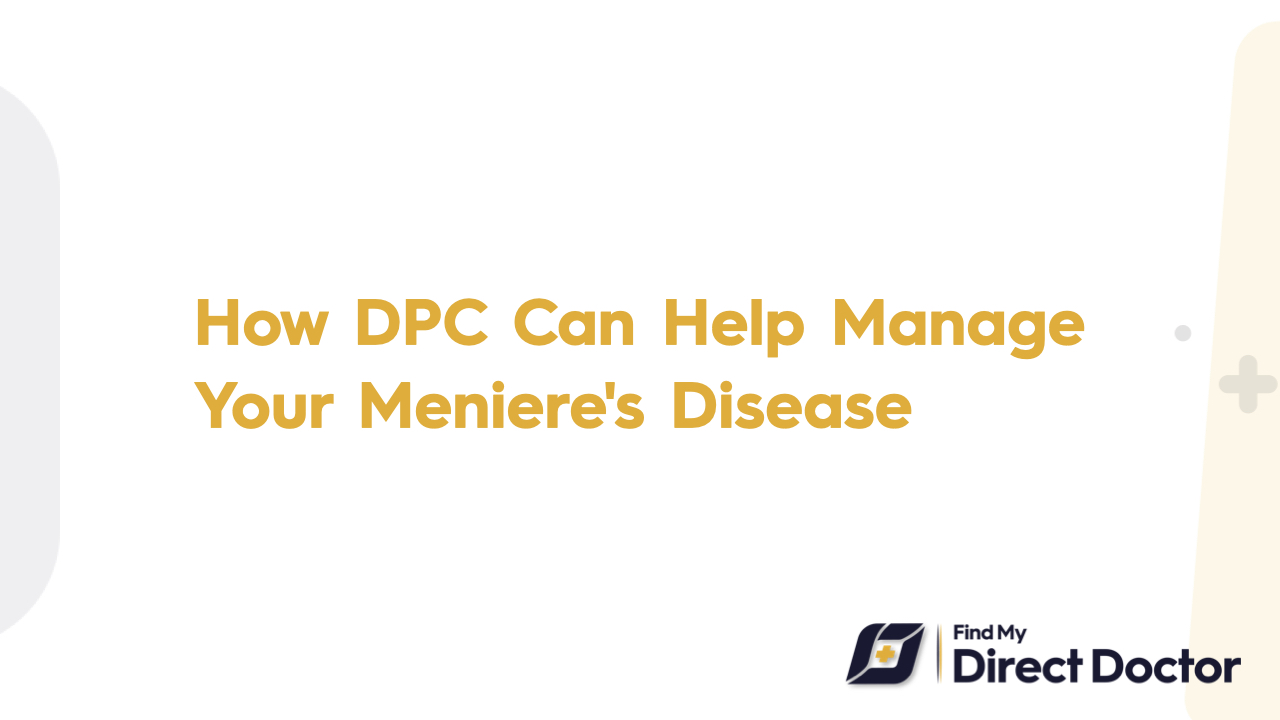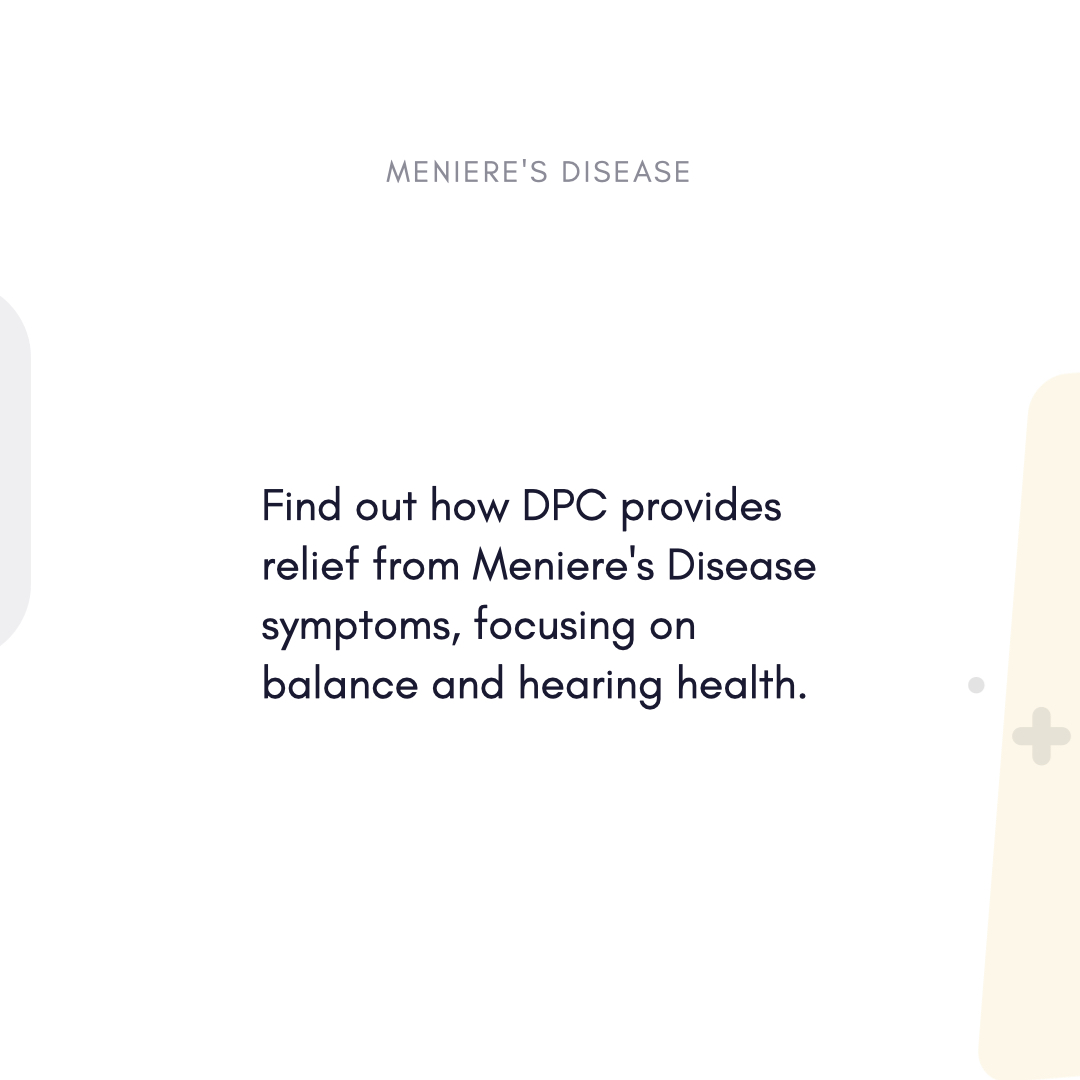Meniere’s Disease and Direct Primary Care (DPC): A Personalized Approach to Managing Vertigo and Hearing Loss
Meniere's Disease (MD) can be isolating, if you have ever experienced sudden vertigo, muffled hearing, or a constant ringing in your ears. Affecting almost 615,000 Americans, this chronic inner ear condition interferes with daily activities with erratic episodes of tinnitus, hearing loss, and vertigo. Many times, traditional treatment leaves patients negotiating hurried visits and scattered treatments. Direct Primary Care (DPC), on the other hand, presents a membership-based approach that gives your needs top priority—not insurance challenges. Let us investigate how.

Dealing with Meniere's Disease
Meniere's disease results from aberrant fluid accumulation in the inner ear, which causes:
- Severe spinning feelings known as vertigo last minutes to hours.
- Tinnitus: Ear ringing, roaring, or buzzing on demand.
- Often in one ear, hearing loss can be either fluctuating or progressive.
- Aural Fullness is an ear pressure or "blockage" sensation.
Long-term risks associated with uncontrolled MD:
- Damage to permanent hearing.
- Fall hazards and ongoing imbalance.
- Anxiety or depression brought on by erratic symptoms.
DPC Changes Things Meniere's Disease Control
Operating on a membership model usually ranging from 50 to 150 USD per month, Direct Primary Care (DPC) provides unlimited access to your doctor for a fixed fee. For Meniere's patients, this means no co-pays, no surprises, and a care plan as distinctive as their symptoms.
1. Customized Service Based on Medical Knowledge
Emphasizing guidelines from the American Academy of Otolaryngology-Head and Neck Surgery, DPC physicians follow:
- Changes of lifestyle: Low-sodium diets, cutback in caffeine and alcohol, and stress management help to lower internal ear fluid retention.
- During flare-ups, strategically use diuretics (such as hydrochlorothiazide), betahistine, or anti-vertigo medications (e.g., meclizine).
- Exercises for vestibular rehabilitation and optimal sleeping help to increase balance.
- Your DPC doctor can map your triggers, real-time treatment adjustments, and even coordinate with ENT specialists during 30 to 60 minute visits.
2. Expensive, Open Treatment
- Through wholesale-priced drugs and labs—e.g., audiograms or MRI referrals at negotiated rates—DPC clinics help to save costs.
- Preventive efforts help to avoid expensive ER trips during vertigo episodes.
- Your membership covers all hidden fees for follow-ups and urgent calls.
3. Ongoing Help for Extended Relief
- Having 24/7 access to your doctor allows you to rapidly change drugs should symptoms get worse.
- Track development with hearing tests or symptom diaries.
- Get mental health tools to help with anxiety related to MD's erratic nature.
Personal Success Stories from Real Life
- Case 1: 45-year-old Sarah suffered with weekly vertigo attacks. Her former physician wrote meclizine prescriptions but never mentioned her high-sodium diet. Her DPC doctor developed a low-sodium meal plan after 45 minutes of looking over her habits and found soy sauce to be a trigger. Her vertigo episodes dropped by seventy-percent in six weeks.
- Case 2: 52-year-old David skipped follow-ups for financial reasons. His DPC clinic negotiated cash prices for his hearing aids and offered reasonably priced in-house balance therapy. These days, he controls his tinnitus with stress-reduction strategies and sound therapy.
FAQs on DPC and Meniere's Disease
- Q: Is Meniere's Disease treatable?
- A: Although there is no cure, most patients find symptom control with lifestyle modifications and focused medications. DPC guides you in creating a long-term sustainable plan.
- For MD patients, is DPC worth the expense?
- A: Indeed. By skipping ER visits, inflated drug prices, and pointless specialist co-pays, members save an average of 20% yearly.
- Q: Suppose I need an audiologist or ENT?
- A: DPC doctor arranges referrals and usually arranges discounted self-pay rates with reputable specialists.
Why DPC Benefits Patients With Meniere's Disease
DPC is commended by the American College of Physicians for enhancing patient-doctor relationships, which is essential for controlling MD and other chronic diseases. Among the advantages are:
- Aligns with otolaryngology recommendations for customized MD management in precision care.
- Same-day visits help to prevent small flares from turning into crises.
- Holistic Focus: addresses not only symptoms but also root causes including diet, sleep, and stress.
Undertake Management of Your Meniere's Disease Nowadays
You do not have to live in constant anxiety about the next vertigo attack. One balanced step at a time, DPC helps you to reclaim your life by means of a partner who understands your history, respects your budget, and enables you.






